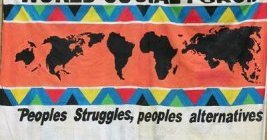The WSF International Council held in April in Abuja was devoted primarily to a strategic seminar and its results prompt an evaluation of the Forum’s role and usefulness.
The WSF debate was guided by a collection of articles and draft statements that were released on the Forum’s website in the months preceding the meeting in Abuja. The articles were penned by representatives of the altermondialistic movement presenting their analysis of the global context, the movements’ situation and proposals for the future of the WSF process.
The debate will go on into the next month, even if some guidelines have been already clearly identified. The struggle against globalization is a long-term project. Neoliberal policy and ideology is showing its real face through the world economic crisis, the growing of social injustice even in the richest societies and the impending ecological disaster brought on by global climate change. Nevertheless, neoliberalism still maintains a strong cultural hegemony thanks to consumerism, securitarism and fears produced by war, terror, clash of civilizations, and social insecurity.
The need for popular participation
The real political change sought by WSF cannot be the result of a vanguard initiative; it has to come from popular participation. This is the reason why it is so important to put movements’ roots into social, regional, and community dynamic contexts, as well as engage in the concrete issues that emerge on the global stage. The result of mass demonstrations in Seattle and Genoa can be found in the substantial amount of continental, regional, and local struggles and alternative lifestyles present the world over. This articulation is a richness, it has to be supported by providing tools for communication and global interconnection to avoid dispersion and isolation. The debate fostered by WSF should ensure that special attention is paid to the most isolated regions and to various conflict areas. A special effort should be devoted to Eastern Europe, Russia and the Arab World, in order to create a real universal language of change.
WSF can be useful only if it ceases to be an isolated event and instead becomes part of a permanent process.
In this new period, WSF can be useful only if it ceases to be an isolated event and instead becomes part of a permanent process that aims to support and connect the local and regional dynamics. In order to allot more time for the continental Forum, the WSF event will no longer be held on an annual basis. Conversely, the Global Day of Action will be repeated, because it is an opportunity to include local actors that do not send representation to international gatherings. Specific working groups have been established to expand the process in Russia, Asia and Arab World.
Next steps for the World Social Forum
The path towards a real and cohesive World Social Forum already has some clear first steps, starting with Lima in May. In the coming days of the EU-Latin American summit, a big forum of debate and mobilization will be held to prevent the EU from engaging in neo-colonial policies. In July the Maghreb Social Forum will take place in Morocco, and a special meeting of Arab world social movements will be organized there. In September the European Social Forum will be organized in Malmo, Sweden. For the first time a real effort is emerging that intends to improve participation among Eastern European countries and the next preparatory assembly for this initiative will be held in Kiev.
In January 2008 WSF will be hosted by Belem, in the Amazon, and a big part of the event will be devoted to indigenous cultures and ecological issues. Then, after Japan, Italy will host G8 summit in Sardinia; the Italian movements have already begun the discussion how to deal with it using a new approach, closer to the new situation and closer to the movement’s needs.


Follow the comments: |
|
